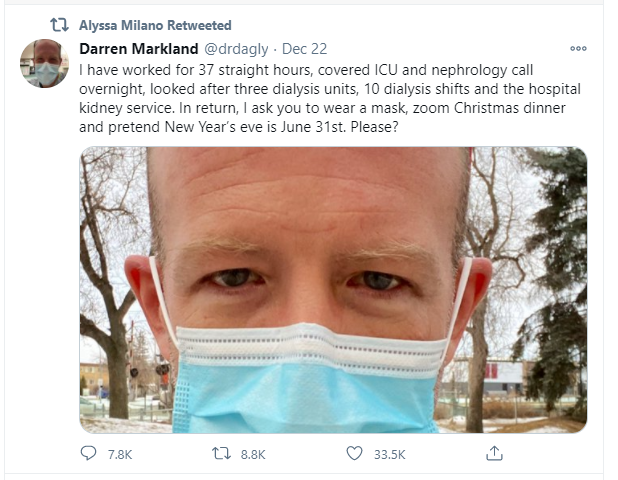As the world careened headlong into the COVID-19 pandemic, three Edmonton doctors saw an opportunity.

“When the pandemic first started, I really saw people were so hungry for information,” said Dr. Lynora Saxinger, an infectious diseases physician at the University of Alberta.
“It was a massive information vacuum and they would take up whatever was in that vacuum, including sometimes very dangerous and bad information.”
READ MORE: Edmonton’s Caulfield brothers battle COVID-19 misinformation with art, science
So Saxinger, Dr. Darren Markland, an intensive care physician at the Royal Alexandra Hospital, and Dr. Shazma Mithani, an emergency room physician at the Royal Alex and Stollery Children’s Hospital, decided it was time to speak up and step into that void of misinformation.
“I think it really is our job as physicians who are there on the front lines to do our best to keep Albertans informed with the most accurate information,” Mithani said.
Mithani and Saxinger had very limited experience with social media and started more actively posting in the spring.
Markland, on the other hand, was a bit more comfortable on the platform, though he was probably more famous for his bicycle and canoe commuting than for his medical advice.
“Twitter for me was a place to run up to the edge of the cliff and just scream. And then one day, the echoes started to talk back,” he said.
Between the three doctors, they have over 31,000 followers on Twitter; a number that surprises even them.

“In a way it almost feels like a weird form of celebrity that I never really thought would happen for an infectious diseases physician,” Saxinger said.
“I don’t think I’m that interesting,” Markland added.
To Markland’s surprise, he’s even been re-tweeted by actress Alyssa Milano.

The three of them see the work they’re doing online as one of the pillars of medical education — advocacy for both their patients and the healthcare system.
It’s what brought them all online in the first place.
“Social media and the desire to share truth and advocacy was shared by all three of us,” Markland said.
READ MORE: Misinformation is spreading as fast as coronavirus
As new “tweeters,” there was a bit of a learning curve.
“I only put out my first thread like, a month and a half ago, and it took me like an hour,” Mithani said. “I wanted to make sure it was well thought out, that I had all of the information that I wanted to get across in a simple and easy to understand way.”
Saxinger shares that concern. Although one other thing causes some worry.
“It makes me feel a lot more conscious of my typos because a lot of people see them,” she said.
While social media can be an escape for some, it serves a different, more important purpose for these doctors.
Markland hopes to give his followers a chance to see, and hear, first-hand what’s going on inside the hospital during COVID-19.
“I know that whenever I leave the hospital, the world doesn’t seem as scary. And then I go into it and all of a sudden it’s the reality of the worst case scenarios,” he said.
READ MORE: Coronavirus misinformation is spreading — what is Canada doing about it?
For Mithani, it’s mostly about making information accessible and easy to understand.
“We have a way of simplifying things and helping the public understand more clearly what the best things to do are during the pandemic,” she said.
Saxinger said she’s an introvert and would often turn down interview requests from media outlets. That changed when the pandemic hit.
“Researchers, physicians and academics, we often try to figure things out,” Saxinger said.
“But, in a way I think our responsibility doesn’t end with figuring it out. I think our responsibility ends with actually communicating it in a way that actually helps our community.”
As with experiencing anything new, there also comes some lessons.
“There’s definitely a time where you have to stop doom-scrolling and put down the device and just get away from it. And I think I’m getting a better sense of that balance as well,” Saxinger said.
Markland has a few other lessons he’s learned from his social media experience:
“Don’t tweet when you’re drunk. Don’t tweet when you’re sleep deprived. Be a nice person and that goes a long way.”
Markland, Mithani, and Saxinger are all friends outside the social media sphere. Markland and Saxinger have known each other since medical school, and Markland was Mithani’s mentor while she was doing her residency.
“It’s pretty fun to go through this journey with them. We text a lot,” Mithani said.
For Markland, it’s clear why people turn to them.
“We are gregarious and outgoing and social and that’s part of the reason I think we’re the doctors that we are,” he said.
But he makes sure to keep social media and the real world separate.
“One’s got to be humble when they’re a physician — because if you take your eye off the ball you become a bad doctor and a good tweeter.”



Comments